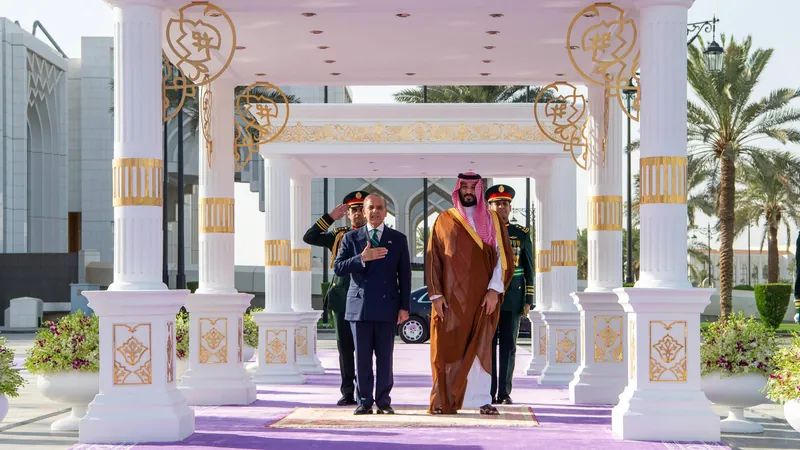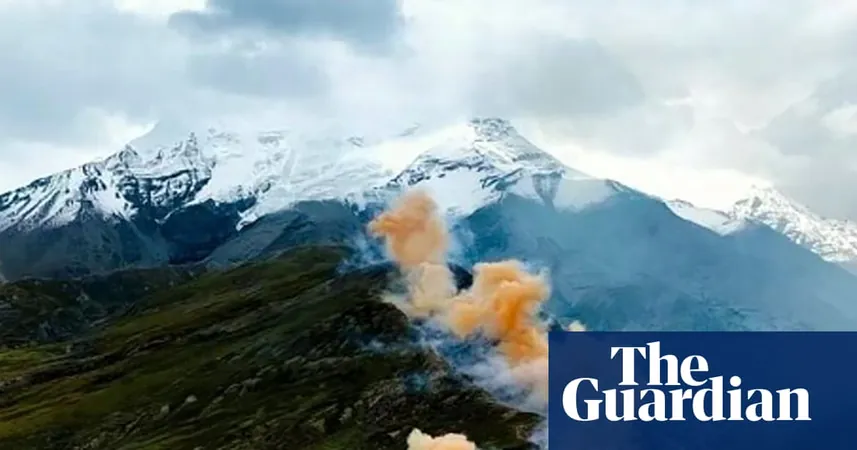
Saudi-Pakistan Defense Pact: A New Power Grab in the Middle East
2025-09-20
Author: Ting
A monumental security pact has emerged from the Middle East, with Saudi Arabia and Pakistan forging an alliance that even inspired a thematic song celebrating their partnership. "Pakistan and Saudi Arabia, brothers in faith," the lyrics echo in Arabic, signaling a historic commitment to mutual defense.
This agreement comes on the heels of a pivotal meeting in Doha, where nearly 60 officials from Muslim-majority nations gathered to address recent Israeli aggression, including an unprecedented strike on Qatar. While a Saudi official claims the pact has been years in the making, its timing—just days after the attack—signals a unified front in the face of regional threats.
Experts emphasize that this deal formalizes a longstanding reliance on Pakistan for defense. The pact stipulates that any hostility directed at either nation will be perceived as aggression against both, highlighting the emerging strategic relationship.
Nuclear Ramifications and Regional Stability
Though specific details of the pact remain confidential, the implications are significant: Pakistan, the only Muslim-majority country with nuclear weapons, has indicated its atomic capabilities will be accessible to Saudi Arabia as part of this agreement.
Pakistan's nuclear prowess, established in the late 1990s after covert development, raises questions about regional security dynamics. While experts caution that this doesn’t instantly catapult Saudi Arabia into nuclear status, it does create a precarious balance in military strategy within the region. Should Saudi Arabia face aggression, potential nuclear deterrents vastly complicate typical military calculations.
A Shift in Middle Eastern Alliances
The pact between these two nations is not merely about the nuclear arsenal. Analysts point out that Saudi Arabia is also looking to bolster its conventional military capabilities through Pakistan. The recent short conflict between Pakistan and India showcased the advanced capabilities of the Pakistan Air Force, drawing attention from regional players.
Moreover, the security agreement illuminates Saudi Arabia's broader strategy to diversify its military partnerships beyond traditional allies like the United States, contemplating deeper ties with China and utilizing Pakistani military expertise.
Economic Interests and Regional Pressures
In addition to military benefits, this partnership carries significant economic implications for both countries. Pakistan's precarious financial situation makes Saudi investment attractive, signaling potential collaborations in transport, aviation, and energy sectors.
As Pakistan becomes a key player in the Middle Eastern geopolitical landscape, the pact complicates existing relations with India, where recent warmth between India and Gulf States has raised concerns in Islamabad.
An Uncertain Future
With relations between Saudi Arabia and India reportedly stronger than ever, the impact of this new alliance on regional diplomacy remains to be seen, particularly how Israel might react. The pact could escalate Israel's focus on Pakistan, shifting it further up their priority list for potential strategic maneuvers.
In conclusion, this newly minted Saudi-Pakistani alliance may chart a new course in Middle Eastern politics, intertwining security, economics, and military resources in an era of evolving threats—a development that could have ramifications for global stability.





 Brasil (PT)
Brasil (PT)
 Canada (EN)
Canada (EN)
 Chile (ES)
Chile (ES)
 Česko (CS)
Česko (CS)
 대한민국 (KO)
대한민국 (KO)
 España (ES)
España (ES)
 France (FR)
France (FR)
 Hong Kong (EN)
Hong Kong (EN)
 Italia (IT)
Italia (IT)
 日本 (JA)
日本 (JA)
 Magyarország (HU)
Magyarország (HU)
 Norge (NO)
Norge (NO)
 Polska (PL)
Polska (PL)
 Schweiz (DE)
Schweiz (DE)
 Singapore (EN)
Singapore (EN)
 Sverige (SV)
Sverige (SV)
 Suomi (FI)
Suomi (FI)
 Türkiye (TR)
Türkiye (TR)
 الإمارات العربية المتحدة (AR)
الإمارات العربية المتحدة (AR)